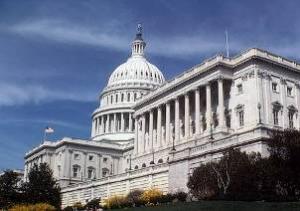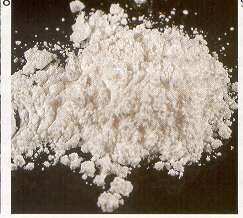We in the drug reform movement are filled with optimism after a historic year and campaign, and we are getting the anti-prohibitionist message out to more and more people than ever. But your help is needed to allow it to continue.
You've got to be kidding! A terrorism training exercise at Shasta Dam in Northern California this month featured pot growers as the terrorists.
The marijuana movement is starting to organize to protect its economic interests, and now, the cannabis movement has a Washington lobbyist.
Sen. Jim Webb's bill to create a bipartisan National Criminal Justice Commission has passed the House of Representatives and the Senate Judiciary Committee. Your phone calls to US Senators could be what passes the bill this year and gets the top-to-bottom review of the criminal justice system started.
What, no crooked jail guards? How about a federal judge? We've got one this week, as well as a couple of dirty narcs, and a sticky-fingered police captain.
The effort to roll back overly restrictive medical marijuana regulations in New Jersey hit a bump in the state Senate Monday, but it's not dead yet.
An ex-governor is assassinated, and Ciudad Juarez sees its 130th police officer killed this year. Just another week in the prohibition-related violence plaguing Mexico.
Mexican President Felipe Calderon has said money laundering and police reforms are key to winning victory over the drug cartels. But with the jockeying already beginning for the 2012 elections, their prospects are fading.
A fungus that blighted the Afghan opium crop this year is being blamed for heroin shortages in England that are leading to adulterated smack and even fake smack, and that's sending some users to the hospital.
The election of a rightist governing coalition in the Netherlands will result in the banning of foreigners from the country's famous coffee shops. Are windmills and tulips enough to get you to go?
A pot legalization bill passed the House in the US territory of the Northern Marianas Islands a couple of weeks ago, but now it has been killed in the Senate.
Pioneering psychedelic pharmacologist Alexander "Sasha" Shulgin has suffered a stroke, but is expected to recover.
What a year it's been!
If you've been reading
Drug War Chronicle or our
Speakeasy blog, you know how encouraged we are by
California's Prop 19 marijuana legalization initiative -- the positive media coverage ... the new, mainstream allies it brought in to the movement ... the relative closeness of the vote in a year that favored conservative election turnout.
Despite the initiative not passing
this time, we believe that time is on our side.
Our time will be here
soon.
Adding to our excitement is the phenomenal success that our newly-redesigned web site has experienced in its first few months. The improved site, our more up-to-the-minute publishing, and the excitement of Prop 19, all combined to bring
more than half a million people to StoptheDrugWar.org during the weeks leading up to the election.
We are taking the anti-prohibitionist message to more people than ever.
Would you please consider sending a
donation to help us keep the message going?
We are pleased to offer three new membership premium gifts, reflecting our optimism for the future:
- Cannabinomics: The Marijuana Policy Tipping Point, book by Dr. Christopher Glenn Fichtner, points the way to a brighter future beyond the current drug war.
- Emperor of Hemp, a re-released memorial tribute edition of the classic video, honors the movement pioneer Jack Herer whose efforts enabled much more to follow.
- My Medicine, by Irv Rosenfeld, tells his story as one of now only four patients in the federal government's medical marijuana program, and chronicles the history of medical marijuana as it's unfolded in the US to its incredible place today.
Donate $15 or more for Emperor of Hemp, $35 or more for Cannabinomics or My Medicine, $45 for the video and either book, $60 for both books, or $75 or more to get all three.
Resources are tight in the drug policy reform movement right now, despite the excitement of the election. At StoptheDrugWar.org we have therefore focused our efforts on the work that we're the best at -- high-quality, journalistic level, original publishing about the drug war; and using our web site and email list to grow and support the entire drug reform movement -- Prop 19, sentencing reform, medical marijuana in the many states, everything.
We have made huge strides, and reform activists from the rank-and-file up through the leadership tell us what a difference our work makes for them.
But because the economy and funding situation is what it is, we need your help as this special year draws to a close -- please make a generous donation supporting StoptheDrugWar.org today.
Sincerely,
David Borden, Executive Director
StoptheDrugWar.org
Washington, DC
http://stopthedrugwar.org
P.S. We are grateful for your donation, whether it's large or small -- believe me, even the small ones add up to make a difference!
P.P.S. If you'd rather donate by check, select the "mail-a-check" option in our donation form, or send a check payable to DRCNet Foundation (tax-deductible for our educational work) or Drug Reform Coordination Network (non-deductible, supports our lobbying work) to P.O. Box 18402, Washington, DC 20036.
back to top
Northern California pot growers bomb a car and a bus, then take over Shasta Dam in a bid to free an imprisoned comrade. It sounds like the plot to a very cheesy Grade-B thriller, but it was actually the premise for a day-long terrorist attack drill conducted by 20 state, local, and federal law enforcement agencies Wednesday.

Shasta Dam (courtesy US Bureau of Reclamation)
According to an account published in the local paper the
Redding Record Searchlight, the Shasta Dam scenario had the "Red Cell" pot grower/terrorists blowing up the car and bus to create a distraction and then taking over the dam. Holding three people hostage, the terrorist pot growers then threaten to flood the Sacramento River by opening the flood gates unless their imprisoned comrade is freed.
The drill was part of the US Bureau of Reclamation's Critical Infrastructure Crisis Response Exercise Program, which started in 2003. It identified six dams, including Shasta, the nation's second largest, as possible terrorist targets. Similar exercises took place at Utah's Flaming Gorge Dam in 2003, Washington's Grand Coulee Dam in 2005, and Hoover Dam on the Arizona-Nevada border in 2008. But none of those exercises identified pot growers as the putative terrorists.
According to bureau spokesperson Sheri Harral, the drill took 18 months of planning and cost the bureau $500,000. The other emergency and law enforcement agencies that participated paid their own expenses.
As of press time, Harral had not returned a Chronicle call asking why marijuana growers were selected as the terrorists. Northern California is home to thousands of pot growers, many of them doing it legally under the auspices of California's medical marijuana law. There are no known incidents of pot farmer terrorist attacks on critical infrastructure.
Dale Gieringer, head of
California NORML and an observer of the state marijuana scene for decades, told the Chronicle he was unaware of any California pot grower terrorist cells—ever. "No, never," he said.
Nor was he impressed with the pot grower as terrorist scenario. "That was so stupid," he sighed. "I don't know what inspired it. I can see the need to do better pat downs for air travelers to make sure they're not holding joints in their underpants, but this? It sounds like something some yahoo red county sheriff would dream up."
Neither was the
Marijuana Policy Project amused. "This is a classic example of law enforcement's utterly inaccurate stereotype of who is involved with marijuana," said the group's communications director, Mike Meno. "For decades, they have villainized users and people involved in the industry to such an extent that they now equate them with terrorists. It might be laughable," he said, "but it gives us real insight into the drug warrior mentality and what they think of marijuana people."

"Red Cell" plotter? No, just more Reefer Madness
"The whole idea that they would equate growers with terrorism is absurd and insulting," sputtered
NORML founder Keith Stroup. "This is too ignorant to take seriously. It's hard to imagine that in this time of fiscal crisis, someone would have the nerve to propose spending money on such a ludicrous exercise. My goodness! Of all the potential violent criminals out there, the idea that they would focus on pot growers shows that this is a political game," he said.
"People will be laughing about this for decades," Stroup continued. "You have almost half the people in California voting for marijuana, and on the other hand, this. It's hard to believe this is going on.
At least, they could have called it the "Green cell."
back to top
The marijuana industry is growing up. On Tuesday, the National Cannabis Industry Association (NCIA) officially came into being to represent the interests of the marijuana industry and its consumers. The group aims to influence policy in Washington, DC, just the same way any other industry does -- by lobbying the federal government to protect the interests of its members.
"We've seen such tremendous growth in this industry in the last five years," said NCIA executive director Aaron Smith. "It seems like the industry is not just surviving in the midst of economic decline, but booming. But it wasn’t represented in Washington, DC, like all sorts of other industries are. I just started talking to some of the major industry players, and just about everybody was really enthusiastic about jumping on board. This thing just blossomed."
The makeup of the NCIA's
board of directors, with about one third of its 23 members from California, one third from Colorado, and one third from the rest of the country, correlates roughly with where the cannabis business action currently is. Most of the board members represent dispensaries or associated businesses, but there's also Kush magazine, Weedmaps.com, a pipe-market, an insurance company, and a hemp-seller.
At least three board members have well-known positions favoring marijuana legalization. As long-time head of the Marijuana Policy Project, Rob Kampia has put big money into legalization initiatives; Oaksterdam University's Dale Sky Jones was a spokesperson for the Proposition 19 legalization initiative; and as director of Sensible Colorado, Brian Vicente is working with others to get a legalization initiative on the ballot there in 2012.
"We wanted to be diverse in the types of businesses represented," said Smith. "It's not just dispensaries, it's all these other businesses creating thousands of jobs and hundreds of millions of dollars for the economy."
Becky DeKeuster is CEO of Northeast Patients Group, which will operate four state-licensed, nonprofit medical cannabis dispensaries in Maine. DeKeuster joined the NCIA board of directors and hopes to encourage others in the medical cannabis community to support the fledgling trade association. "I’m proud to be one of NCIA’s founding members," DeKeuster said. "This organization will be a great step forward not only for the medical cannabis industry, but also for the interests of the countless patients nationwide who rely on us to provide safe and effective natural medicine."
Another NCIA board member, Kush Magazine CEO Bob Selan, said that the trade association will be the force that finally unifies an extremely diverse industry. "In my years working for a top cannabis culture publication, I’ve met an astonishing number of talented individuals who are experts in their particular field. From cannabis cultivators to pipe manufacturers to crop insurance brokers, all will benefit from being collectively represented by the national industry association," Selan said.
The NCIA wants to attract at least 200 members in the coming year, Smith said. Regular membership costs $1,000 a year, a sponsoring membership is $2,500 a year, and a sustaining membership is $5,000 a year. If the group meets its membership goals, it could raise a minimum of $200,000 to go to work on Capitol Hill.
A sponsoring membership gives the member the right to vote on the group's board, half of which will be up for election each year. A sustaining membership gives the member the right to run for a place on the board. With the board setting policy, the NCIA is an association that will truly be run by its members.
"Our intention is to hire a lobbying firm," said Smith. "Right now, we have Steve Fox from MPP working part-time for us. As we raise funds, we'll be hiring lobbyists in the District and bringing in a full-time staff."
The group will work to get the federal government to let states set their own marijuana policies, and to ensure that federal agencies treat businesses compliant with state laws just like any other law-abiding businesses, said Smith. He pointed to agencies like the IRS and the Treasury Department, as well as the Department of Justice.
"We want cannabis-related businesses treated the same as any others," he said. "Now, we have things like banks not accepting deposits from legal medical marijuana providers. We may well be lobbying executive agencies to make administrative changes, as opposed to congressional action."
Smith is based in Phoenix, which, as he pointed out, is the "next wave" of legitimate cannabis businesses after Arizona became the 15th medical marijuana state earlier this month, but he'll be hitting the road to build the NCIA, he said. "I'll be traveling the country and getting new members to get the clout we need to make the change we want. Our lobbyist will be representing hundreds of businesses, thousands of jobs, and millions of tax dollars. It's really important we build membership as fast as we can."
The NCIA is in embryonic form right now, but it has the potential to open a new front in the battle to end the persecution of marijuana users and producers. The degree to which it succeeds will be a measure of the real maturity of the contemporary marijuana industry.
back to top

US Senate
Please call the following Senators to ask them to prioritize and support Senate passage of the NCJC Act, H.R. 5143 and S. 714, this year:
- Senate Majority Leader Harry Reid (D-NV), 202-224-3542
- Senate Minority Leader Mitch McConnell (R-KY), 202-224-3135
- the two US Senators from your state -- call (202) 224-3121 or click here to look them up.
The following is a message for your call to the Senators' offices:
I am calling to ask the Senator to prioritize and support immediate Senate passage of the House-passed National Criminal Justice Commission Act, H.R. 5143/S. 714, because:
- Having a transparent and bipartisan Commission review and identify effective criminal justice policies would increase public safety.
- The increase in incarceration over the past twenty years has stretched the system beyond its limits. These high costs to taxpayers are unsustainable, especially during these tough economic times.
- The proposed commission would conduct a comprehensive national review -- not audits of individual state systems -- and would issue recommendations -- not mandates -- for consideration.
Write back if you have any questions, and please let us know if you learn anything about your Senator's intentions from your phone call. Thank you for taking action.
back to top
What, no crooked jail guards? How about a federal judge? We've got one this week, as well as a couple of dirty narcs, and a sticky-fingered police captain. Let's get to it:
In Atlanta,
a federal judge pleaded guilty Friday to charges he illegally possessed cocaine, marijuana, and Roxycodone. Senior US District Judge Jack Camp also admitted he gave a government-issued laptop to a stripper with whom he allegedly used the drugs. Camp went down after the stripper, who had a previous drug conviction, started snitching to the feds, and he was busted when he and the stripper bought a quantity of drugs from an undercover FBI agent. Camp has now resigned from the federal bench and is looking at up to four years in prison when he is sentenced March 4.
In Las Vegas,
a former Chicago police officer was arrested Friday on federal drug and conspiracy charges. Retired Chicago cop Glenn Lewellen, 54, was indicted by a federal grand jury for using his position as a police officer to provide information about ongoing federal investigations to members of a drug dealing organization between 1999 and 2002. He is charged with racketeering conspiracy and conspiracy to distribute cocaine. Among his other exploits, Lewellen is accused of sending an innocent man to prison with perjured testimony, obtaining and distributing wholesale quantities of cocaine, and protecting a drug ring that allegedly committed at least two murders and six kidnappings.
In Baton Rouge, Louisiana,
a former McComb County narcotics officer was arrested Friday on drug dealing charges. Conner McGee, also a former Mississippi Bureau of Narcotics officer until this summer, is charged with possession of cocaine with the intent to distribute. No further details are available.
In Batavia, Ohio,
a former Felicity Police Department captain was sentenced Monday for confiscating Oxycontin pills during an investigation and not logging them in as evidence. Delmas Pack, 42, pleaded guilty earlier this month to one count of tampering with evidence. He got two years probation and 200 hours of community service. Prosecutors said they would agree to probation if he promised never to become a police officer again. He did.
back to top
The New Jersey General Assembly Monday voted 48-22 to require the administration of Gov. Chris Christie (R) to make major revisions to its proposed regulations around medical marijuana, but backers of the changes were unable to come up with enough votes to pass them in the Senate. Under the resolution, the administration would have to make changes to its rules or they would be invalidated.

patients share victory hug after passage of legislation, January 2010
The Christie administration has infuriated medical marijuana supporters by first delaying the implementation of the program and then proposing strict regulations on the program. Among other things, the rules propose licensing just two medical marijuana growers and four distribution centers, as well as capping the potency of medical marijuana -- something no other state has attempted.
Sen. Nick Scutari (D-Union City) told the
Newark Star-Ledger Christie was was "overstepping his bounds" by "refusing to implement a program" that is now the law in New Jersey. He said he pulled the Senate resolution from the agenda after learning that one Democratic senator was absent and another would vote against it.
"It's very frustrating," said Scutari about the decision by Sen. Brian Stack (D-Hudson) to vote against the resolution. Stack had voted for the medical marijuana bill, Scutari noted, before suggesting that Stack, who is the mayor of a cash-strapped town, did not want to cross the governor.
Scutari will bring the resolution back before the Senate for a vote on December 13, he said.
back to top
by Bernd Debusmann, Jr.
Mexican drug trafficking organizations make billions each year smuggling drugs into the United States, profiting enormously from the prohibitionist drug policies of the US government. Since Mexican president Felipe Calderon took office in December 2006 and called the armed forces into the fight against the so-called cartels, prohibition-related violence has killed more than 30,000 people -- as of this week more than 9,000 this year. The increasing militarization of the drug war and the arrest of dozens of high-profile drug traffickers have failed to stem the flow of drugs -- or the violence -- whatsoever. The Merida initiative, which provides $1.4 billion over three years for the US to assist the Mexican government with training, equipment and intelligence, has so far failed to make a difference. Here are a few of the latest developments in Mexico's drug war:

Edgar Villarreal (''La Barbie''), after capture
In the city of Chihuahua,
two Ciudad Juarez attorneys and a companion were executed after being snatched off a street by an armed commando. The two men were in Ciudad Juarez to investigate a case for a client they represent who faced federal charges.
Friday, November 19
In Tamaulipas,
11 suspected members of the Zetas Organization were killed during a clash near the town Nueva Ciudad Guerrero. The firefight occurred after soldiers on patrol came under fire. Two other gunmen were captured and nine rifles were seized, as well as four handguns, a grenade launcher and body armor.
In Ciudad Juarez,
five people were murdered across the city. Among the dead was a municipal policeman who was gunned down on his day off. He is the 55
th municipal police officer killed this year. In total, 130 policemen from the various law enforcement bodies that operate in Juarez have been killed so far in 2010.
Saturday, November 20
In Mexico City,
authorities began the process to extradite Edgar Valdez Villareal, better known as
La Barbie, to the United States. Valdez, 37, was a high ranking lieutenant in the Beltran-Leyva Organization before being captured in August. He is charged in a 2002 indictment in Louisiana and a 1998 indictment in Texas, both for his involvement in cocaine trafficking. Valdez is a US national, as he was born in Laredo, Texas.
Sunday, November 21
In Colima,
a former state governor was shot and killed at his home. His wife was wounded in the attack. Cavazos left office in November 2009. He is one of several governors, ex-governors and gubernatorial candidates killed in Mexico in the last few years. Colima has been relatively free of the rampant drug-related violence seen in other parts of the country. The state Secretary of Economic Development, who was visiting Cavazos at the time of the attack, was also wounded in the incident.
In Tepic, Nayarit,
five suspected drug traffickers were shot and killed during a series of firefights across the city. The incident began after soldiers began chasing a vehicle with armed men aboard. One gunman was captured in the incident, and two soldiers were wounded.
Monday, November 22
In Colima,
police accidentally shot dead a doctor during an operation to find the killers of ex-governor Cavazos.
Tuesday, November 23
In Brownsville, Texas, border patrol agents seized over
700 pounds of marijuana in the remote Flor De Mayo area of the city, which is located off Highway 281 and is just across the Rio Grande. The area is a well-known crossing point for drugs coming from Tamaulipas.
Total Body Count for the Week: 159
Total Body Count for the Year: 9,241
Read the previous Mexico Drug War Update here.back to top
Mexican President Felipe Calderon has made his war against his country's so-called drug cartels the centerpiece of his presidency. But with prohibition-related violence at record levels and with his single six-year term already past the halfway point, Calderon's ability to get what he considers key reforms through the Mexican legislature is in doubt, and so is his legacy.

Felipe Calderon -- already a lame duck?
More than 30,000 people have been killed since Calderon deployed the army nearly four years ago in a misbegotten bid to crack down on the cartels. With his brute force strategy failing to produce the desired results, and with rising pressure from fearful citizens and hesitant foreign investors, not to mention the United States, Calderon has turned to a pair of legislative initiatives to rescue his crusade.
One measure would reform policing by placing the 22,000 municipal police agencies under the control of state governors. The municipal agencies are notoriously susceptible to the threats and entreaties of the cartels, who are fighting the government and each other to control lucrative smuggling franchises.
The other measure would strengthen money laundering legislation in a bid to hit the cartels in the wallet. A bill he announced in August is aimed at getting the government's hands on a larger share of the estimated $40 billion a year in cartel revenues.
But despite the climate of crisis provoked by the daily drumbeat of shoot-outs, kidnappings, beheadings, and other acts of horrorific exemplary violence, Calderon's agenda is running up against political calculation and is stalled and in danger of dying without being enacted. With the political parties jockeying for position ahead of elections in 2012, and with dissension within his own ruling PAN, Calderon's reform proposals will most likely be watered down significantly if they are passed at all.
"There is no consensus among lawmakers, not even within the PAN. There is a lot of opposition to the proposal for a unified police command," PAN Senator Alejandro Gonzalez, who heads the Senate's justice committee, told
Reuters.
"The Mexican Congress has used its newly acquired power not to push through modernizing reforms but rather to control and thwart the executive at every turn," said political analyst Denise Dresser.
Calderon tried to fight back last week, telling reporters the money laundering reforms and the unified police command "are the key to our security." He emphasized the money laundering provisions, saying, "The goal is to hit the criminals where it hurts most, on the economic front."
While the money laundering reforms have more support than the police reforms, they still face an uphill battle. "The president introduced this initiative with a lot of force but it got stuck in the Senate," Jose Trejo, the PAN senator who heads the finance committee, told Reuters. "If it passes, it will only be with various changes. It will be complicated in this session."
Calderon and the PAN need the support of the main opposition party, the PRI, to get his reforms through the congress. But neither the PRI nor the leftist PRD are likely to hand Calderon any legislative victories before the 2012 elections. Congress will recess on December 15 without having moved on the legislation, and the prospects for passage next year are even dimmer.
back to top
A scarcity of heroin in England is leading to a growing number of drug overdoses and poisonings as users ingest dope cut with other substances by dealers trying to stretch supplies, The Guardian reported this week. Scene watchers there are calling it the worst drought in years.

Are you sure that's heroin? Be careful out there, especially in England
The drought is being blamed not on seizures by law enforcement agencies, but on a fungus that has blighted the Afghan opium poppy crop, reducing the size of this year's poppy crop by half. Afghanistan accounts for more than 90% of the world's opium production and likely 100% of the British heroin supply.
"There is a very significant heroin shortage across the UK at the moment," said Gary Cross, head of drug policy for the non-profit group Release. "It has been going on for some time now, but the last two months have seen stockpiles exhausted."
"I've never known anything like it in 30 years," wrote one long-time heroin user on an on-line forum discussing the shortage.
As dealers and users scramble to grapple with the shortage, users are turning up at hospitals after ingesting adulterated heroin or, in some cases, fake heroin consisting of a powerful sedative, caffeine, and paracetamol, a bulking agent. Some have passed out after smoking or ingesting, while others have reported vomiting, amnesia, and flu-like symptoms.
"This 'heroin drought' appears to be serious and geographically widespread," said Neil Hunt, director of research at
KCA, a nationwide community drug treatment service. "Street heroin is in a complete and utter muddle at the moment, and users are collapsing unexpectedly. We need to standardize information about what's out there.
"If people use this intravenously, perhaps on top of alcohol and methadone [the prescribed substitute drug for heroin], it is extremely risky," said Dr. John Ramsey, who runs a drug database at St. George's Medical School in London. "We have had many reports of people overdosing. It's really important that accident and emergency departments understand that they may not be dealing with a 'normal' heroin overdose when people are brought in," he said.
Harm reduction drug agencies are aware of the problem and working to address it. Several of them held an urgent meeting last week to discuss setting up an online warning system to give users notice about contaminated or adulterated drugs.
back to top
The newly elected rightist Dutch government said last Wednesday it wants to bar foreigners from buying marijuana in the Netherlands' famous cannabis coffee shops. The move is part of a national crackdown on drug use, a government spokesman said.

The Dutch government doesn't want your business. (image via Wikimedia)
For more than 30 years, Holland has allowed the sale of small amounts of marijuana (currently up to five grams) in coffee shops, even though laws against marijuana possession technically remained on the books. In recent years, conservative governments have increasingly signaled their unhappiness with the status quo and have embarked on campaigns to reduce the number of coffee shops.
Dutch coffee shops are a popular tourist destination, especially with visitors from neighboring France, Germany, Belgium, and other countries with more repressive approaches to pot. But some border towns have already moved to bar foreigners, citing traffic, congestion, and public order problems.
Last Wednesday, Dutch Security and Justice Minister Ivo Opstelten told NOS radio
the governing coalition had agreed to limit marijuana sales to Dutch residents in order to curb crime linked to marijuana production and sales. "No tourist attractions," said Opstelten. "We don't like that."
But it is not "drug tourism" that creates crime around pot cultivation and distribution. Instead, it is Holland's half-baked approach to tolerating marijuana. The Dutch government allows for legal retail marijuana sales, but does not allow for a legal method of growing marijuana to supply the coffee shops. That leaves the door open for criminals to get involved in the trade.
While some border towns have already acted to bar foreigners, there is less enthusiasm for a ban in Amsterdam, home to some 223 coffee shops. The municipal government there said it was studying the government proposal. "We are taking the current practice as a starting point. It is not perfect but in many ways we have a functioning coffee shop system," an Amsterdam city spokesman said.
The "no foreigners" policy has not yet been formally drafted and no firm date for the ban has yet been set. But it looks like foreign pot smokers are about to join Muslims as persona non grata in the brave new Holland.
back to top
The Senate in the Commonwealth of the Northern Marianas Islands has rejected a bill that would have legalized marijuana for both medicinal and recreational use. The bill had passed the House two weeks ago. The bill would have allowed people 21 and over to possess, cultivate, and transport marijuana for personal use.

Saipan -- no pot in paradise (image from Wikimedia)
The passage of the bill by the House marked the first time a pot legalization bill had passed in a legislative chamber in any US territory.
The bill, HB 17-45, was championed by Rep. Stanley Torres (I-Saipan). Earlier this year, a cost-benefit analysis performed by the House Committee on Natural Resources said enacting the bill into law "will possibly result in the loss of federal funds but at the same time the Commonwealth government will generate funds through taxation."
Torres and other legalization supporters also argued that the bill would allow access to marijuana by the ill and reduce crime and violence in black markets.
But Senate President Paul Manglona (R-Rota) said after the House vote that the Senate would kill the bill. "It's for the same reasons I mentioned before," he told the Saipan Tribune, citing concerns about marijuana use's impact on CNMI youth and other ill effects on the community.
And Gov. Beningno Fitial signaled that he was okay with medical marijuana, but not for non-medical.
"I support it for medicinal use," Fitial told reporters. "I never smoke marijuana myself so I cannot talk much about it because I don't have the experience."
A bill just for medical marijuana may be next in the US Pacific territory. Senator Luis Crisostimo, who supported the bill that was just defeated, said he plans to introduce separate medical marijuana legislation.
back to top
Alexander "Sasha" Shulgin, the Berkeley pharmacologist who synthesized hundreds of psychoactive compounds and re-introduced Ecstasy to the world, is hospitalized in San Francisco after suffering a stroke over the weekend, his wife Ann told the British newspaper The Guardian Tuesday. He is 84 years old.

Sasha and Ann Shulgin
"Sasha had a mild stroke over the weekend and is still in the hospital, where they are treating him. He will be undergoing speech therapy for a while," Shulgin told The Guardian. She added that he is not paralyzed and is expected to recover.
Shulgin is a counter-culture hero to generations of psychonauts. Beginning in the 1960s, he synthesized and then sampled hundreds of variations of phenethylamines and tryptamines. The former are related to mescaline, a psychoactive compound found in peyote cactus and the latter are related to the psychoactive compounds in hallucinogenic mushrooms.
That research was anthologized in a pair of books, PiHKAL (Phenethylamines I Have Known and Loved) and TiHKAL (Tryptamines I Have Known and Loved), which Shulgin and his wife co-authored. Both came out in the 1990s.
Shulgin is known in some circles as the "Godfather of Ecstasy" after he re-synthesized
MDMA in 1976 for use in psychotherapy. The drug had been invented by Merck in 1912, but then largely forgotten. After
Shulgin began experimenting with it in the
1970s, its popularity spread rapidly beyond psychotherapeutic circles as it became one of the world's most popular synthetic psychedelics.
Shulgin and his wife have been in tough financial straits recently, and friends have set up a
Facebook page to appeal for donations.
"We need funds for a lot of things including attempts at archiving his work, and that is something we have been asking for money for. But right now it's simply donations for Sasha's health that we need," Ann Shulgin told The Guardian. "The Medicare system in the US pays 80% of certain things but what is left over is considerable, and we are not wealthy. We need around-the-clock care for him right now, and for the next few months, and that can mount up rather fast."
Shulgin is notorious for his decades of drug consumption, but Ann Shulgin was quick to declare that his drug use was not the cause of his stroke. "Considering the hundreds of thousands of people who have experimented with psychoactive drugs and visionary plants, many of them using them as spiritual tools, there is no medical evidence whatsoever that that would be the case. It's simply not true," she told The Guardian.
back to top














